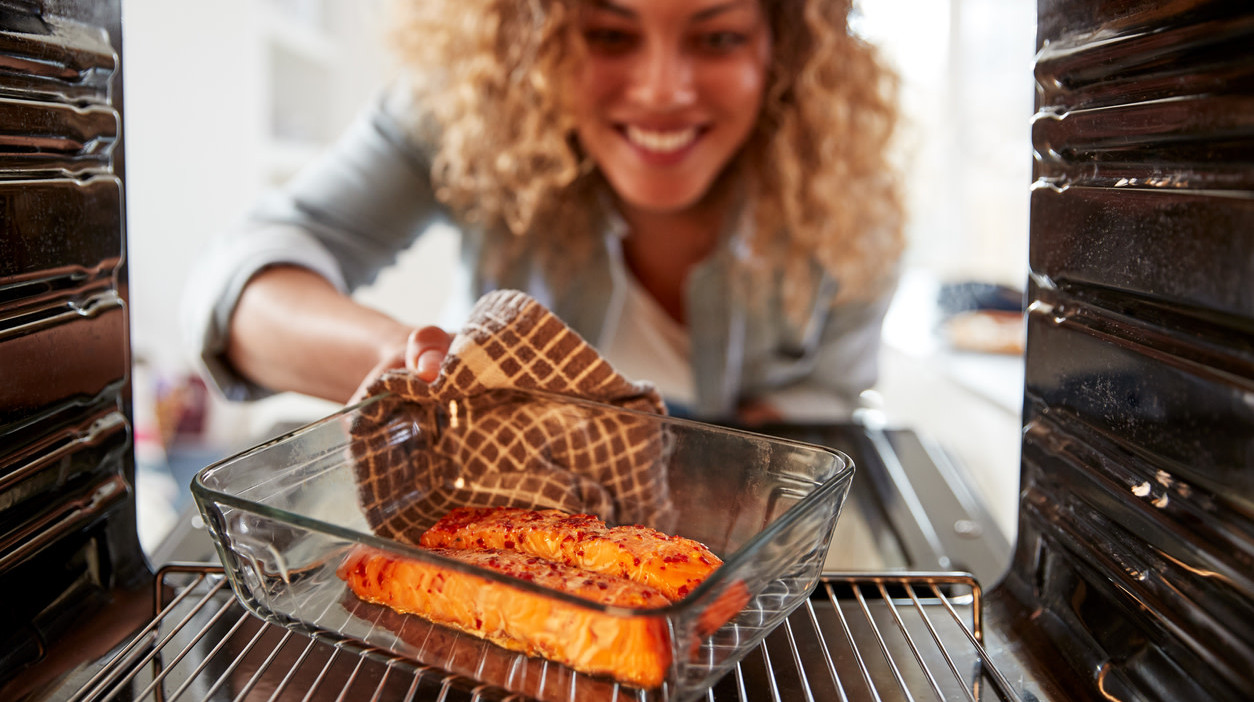How I Learned To Ignore My Inner Gwyneth Paltrow And Accept My Hatred Of Salmon
Like many white women, I have Gwyneth Paltrow living in my head. Not Gwyneth Gwyneth, but a passive-aggressive voice that sounds like hers, patronizing and smiling, who thinks she knows what's best for my health. She's there at the grocery store (If you don't buy ice cream, you won't eat ice cream) and when I'm ordering lunch (Salad is just as delicious as salami). She pipes up more frequently in January, as my holiday season indulgences linger in/on my body and I attempt to feel like a normal, productive, non-hungover human again. I don't always listen to her; I mostly don't. But she whips out one line every so often, and it always seems to get me: Salmon's not so bad, right?
Every few months, salmon and I do a familiar dance. I see salmon at the grocery store, and Gwyneth gives me a, What an easy, healthy weeknight entree! I buy the salmon. I cook the salmon—usually a simple preparation with olive oil and lemon and veggies, though sometimes with teriyaki. I bite into the salmon. I am wholly underwhelmed by the salmon. I continue to eat the salmon because, well, I went through all that work of cooking the salmon. I make it halfway through the salmon, then declare aloud, "This salmon sucks!" I throw the salmon out. I cook up whatever sad (canned) food I have in my pantry. Four months later, I forget all about this experience, and salmon swims upstream back into my consciousness and into my shopping cart. And repeat.
Unless you're allergic to salmon, salmon is extremely good for you. Wild salmon in particular. A fatty fish, it's packed with omega-3 fatty acids, which decrease inflammation and lower your blood pressure. The average fillet has 20-25 grams of protein, nearly half the suggested daily intake. It's packed with B-vitamins, which optimize our brains and nervous systems. Salmon is Good For You. It's a perfect go-to weeknight meal, and at restaurants, it's often the one fish and/or the one healthyish option on the menu. And from what I can tell, adults seem to really like salmon. A quick search for the salmon on NYT Cooking yields 550 recipes, making it the app's most popular fish. (The next is the general "white fish" at 264 recipes, and then tuna at 263.) Eater recently went to bat for salmon burgers. This very website dubbed salmon "nature's perfect fish." And now, after 30 years of fooling myself, after I've tried a solid tenth of those NYT recipes and the takes the Takeout staff adores, both in fillet and in burger form, I can finally admit my truth: salmon totally fucking sucks.
Sure, this is totally subjective. If you like salmon, reading this essay isn't going to convince you that you don't like salmon. Maybe you actually enjoy fishiness overpowering every other item on the plate! Or you prefer your salad protein add-ons joyless and utilitarian! Or you wish every food you consume also had a fleshy gray underbelly you had to scrape off! Taste will always trump an intellectual argument, and who am I to twist your palate to match mine? So instead, I'm stuck with a stubborn, childish opinion: This healthy food is gross and I refuse to eat it!
Our palates evolve as we age. When my dad coerced me into slurping down an oyster at age eight, my face, according to family lore, went green. Now, I can throw back a dozen at happy hour with nary a gag. As a teenager, I relished pumpkin spiced lattes, drinks so sugar-packed they now make me ill. I voluntarily consume brussels sprouts and broccoli and mushrooms and coffee and booze, all of which I'd find revolting as a kid. This isn't just anecdotal: A 2013 study found that humans come out of the womb with a taste for fat and sugar and develop our taste for bitter and salty things as we grow up. But I wonder how much of that maturation is on our taste buds, and how much is about what we're expected to eat as grown-ups, or how much what we eat reflects upon who we are.
As our tastes mature, our metabolisms slow, and the nagging voice telling us to eat healthier gets louder. That means that for grown-ups, it's much more acceptable to reject McDonald's burgers or over-queso'd nachos or sugar-packed coffee drinks than spinach or cauliflower. In admitting I don't like a so-called superfood—even just to myself or my judgy subconscious—I'm admitting something about who I am. That my taste is immature, and therefore, I am immature, an incomplete adult in some way. It's an ongoing battle between my adult self and the kid at the dinner table who couldn't have dessert until she took three more bites. I can hear Gwyneth tsk-tsking in my brain every time I see the bag of salmon taking up space in my freezer, iced over and untouched for months. My salmon cycle—convincing myself I like the fish, eating it, and spitting it all out—is this push-pull between my desire to be an adult and what my senses actually enjoy. Not just to be an adult, but to be a fit, healthy adult.
It's time to rise above the Gwyneth within. Whether your salmon is salmon, or quinoa, or kale, or whatever other so-called superfood, I'm hereby declaring it's okay for you, as a grown-up, to not like it. Just as The Takeout is a safe space to unabashedly love fast food, let it also be a place to go against other cultural norms of adulthood. A place where, just as loving Taco Bell Doritos Locos Tacos goes unjudged, any distaste for generally beloved foods is okay, too. Yes, all food is delicious—but not all food is delicious to all people. So don't you dare comment with your favorite salmon recipe. I promise, I've already tried it.
